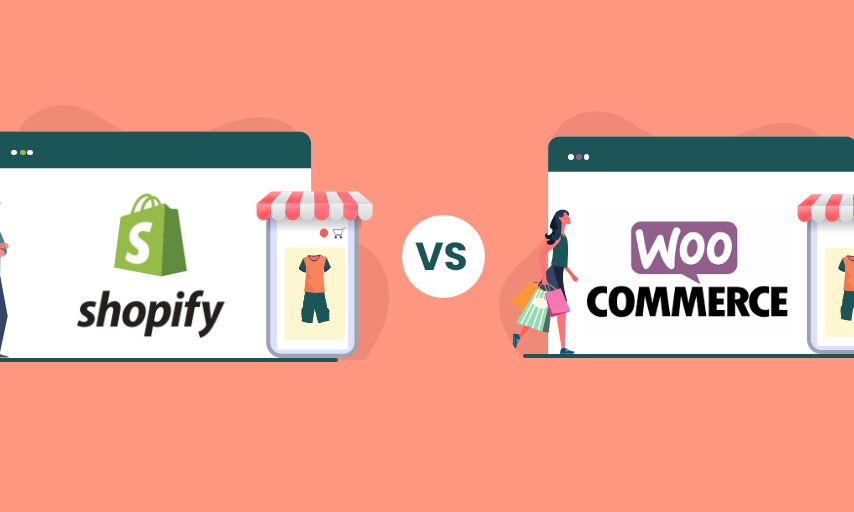Half decade ago Frost & Sullivan forecasted global B2B sales is expected to hit 6.7 Trillions USD in 2020. Well they did.
The whole world stopped and people were limited to their houses last year, it was a disruptive situation for everyone. However B2B eCommerce marketers took the fullest advantage of that chaotic situation.
Superpowers like China and the United States are currently leading the B2B eCommerce market. Popular brands like Alibaba and Amazon are thriving in the B2B business world.
B2B brands who were skeptical about digitizing their brick-and-mortar business got inspired from these big-brands and totally transformed their brand. We believe that’s the best decision they have taken.
However, before launching your brick-and-mortar business in the digital market you need a stable and strong eCommerce platform.
If you visit the digital marketplace, you’ll find plenty of eCommerce platforms. Among those thousands of options Shopify and WooCommerce are most popular and commonly used eCommerce platforms.
But here we’re looking for an eCommerce platform that is suitable for B2B eCommerce business.
So here comes the million dollar question, which eCommerce platform is better for B2B eCommerce business? Shopify or WooCommerce?
Today, in this article we’ll compare eCommerce platforms from a B2B perspective.
But we jump into that, we’ll first give an overview on both the eCommerce platforms.
So let’s begin
Overview : Shopify vs WooCommerce
Shopify
Shopify is a dedicated all-in-one eCommerce platform that is specifically used to build and design online stores. It offers plenty of advanced tools including, payment acceptance to inventory management to streamline the whole business.
Shopify is designed to fulfill your business needs effortlessly. It is a closed-source eCommerce solution that not only assists you in building an online store but it efficiently looks after all the technical aspects of it. You can hire shopify expert to develop an e-commerce store and boost online business.
WooCommerce
Basically WooCommerce is just like other plugins of the WordPress. WordPress is one of the most stable, secure and popular CMS platforms. It’s not just a simple plugin but it’s a highly powerful plugin that is capable of creating an outstanding B2B eCommerce store with only a few clicks.
Since WooCommerce is a WordPress plugin which is an open-source platform, it’s highly customizable and flexible. If you look from an eCommerce lens, it offers all the primary as well as advanced features which you require to build a noteworthy B2B eCommerce Store.
Unfortunately, when it comes to WooCommerce, you have to yourself handle the technicalities of it. You must have a little knowledge about WordPress since from domain name to user roles management, you have to handle every technical aspect of it.
Let’s start with comparing the two most popular eCommerce platform
Shopify vs WooCommerce: Features, Price and Payment Gateways
Shopify is a subscription based tool that is a complete eCommerce solution which offers 24/7 live customer support via email,chat and Twitter. Whereas, WooCommerce is a WordPress plugin. You start your eCommerce store on it, you need to purchase a domain name, web hosting account and a SSL certificate.
WooCommerce provides support to customers via online forums and channels. There is no phone support option in it. With Shopify you get unlimited web storage, while WooCommerce doesn’t provide any web storage, it depends on your web hosting plan.
Store design features
With Shopify you get over 70 templates. However there is no room for modification in them since it’s a closed-source eCommerce platform. But it provides a free SSL certificate. Moreover, you can also get to know how does a catalyst work.
On the other hand, we have WooCommerce that offers thousands of free and premium themes to users which are highly customizable. Unfortunately, they don’t provide a SSL certificate. Users either need to purchase it manually or choose a hosting server that offers it in the hosting plan.
The common aspect of the platforms is they allow users to sell any product (digital or physical).
Pricing
The basic plan of Shopify costs $29 monthly. If that’s not sufficient for your business you can upgrade to Shopify’s main plan which costs $79 monthly. The advanced plan is also available for big brands that cost $299 monthly.
WooCommerce comes for nothing, it’s just like other free plugins offered by WordPress.
Even if Shopify is a little overpriced it offers a domain name, hosting provider and SSL certificate in the package. Whereas, in WooCommerce you have to purchase all three things.
A domain name ideally costs $15, a hosting server charges around $7.99 monthly, and an SSL certificate if bought separately costs $70.
Payment gateways
Shopify has its own payment gateway. It costs approximately 2.9% plus 30 cents per transaction. If you add other payment gateways you need to pay 2% extra charges of every transaction made.
WooCommerce by default provides PayPal and Stripe for transactions. Even though these are third-party payment gateways, WooComemrce fortunately doesn’t charge any additional charges on any transaction.
That was just a general overview of what both eCommerce platforms have to offer. Now let’s find out which eCommerce solution for Business-toBusiness eCommerce.
Shopify vs WooCommerce – A Business-to-Business Comparison
ShopifyPlus
Shopify plus, a flagship product of Shopify that is designed especially for B2B businesses. It offers some top-notch B2B specific advanced features that users can easily use to build an outstanding B2B eCommerce store.
Apart from offering a dedicated business-to-business eCommerce step, it provides numerous value-laden pioneering feature including,
- Product Catalog Management
- Password Protected Shop
- Search Engine Visibility
- Integrates easily into your existing system
- Purchasing Terms
- Expert Inventory Management
B2BWoo
A few years back there was a severe lack of a B2B dedicated eCommerce Platform. Thanks, WooCommerce, things have changed.
Like Shopify, WooCommerce introduced a B2B dedicated eCommerce platform also known as B2BWoo.
B2BWoo is an all-in-one eCommerce Solution that is the perfect choice to start your B2B eCommerce store. It’s packed with plenty of top-notch features to streamline your wholesale business seamlessly.
Let’s check some of the note-worthy features of B2BWoo
- Quick Order Processing
- Corporate Account Management
- Show or Hide Services and Products
- Integrates seamlessly with other technology stacks
Shopify vs WooCommerce: Which is your right option?
After discussing the features, pricing and other necessary elements of both the eCommerce solutions, it’s the time to answer the million dollar question. Which is better?
Well, honestly if you look at the recent eCommerce statistics, WooCommerce is being used commonly by eCommerce marketers. However, big enterprises prefer Shopify more.
But which is better for B2B eCommerce business? Who is leading the race?
In terms of functionality and performance, both the eCommerce solutions are pretty similar. The main goal of both the platforms is to improve user experience and streamline the business process.
Whether you choose Shopify Plus or B2BWoo, both eCommerce solutions are high-scalable, optimally integrate with existing systems and help you in selling your products and services to customers across the globe.
The ball is in your court, it’s’ up to you totally which eCommerce solution you choose. Just a piece of advice from us, if you’re not good at handling technical aspects then the best eCommerce solution for you is ShopifyPlus.
On the other hand, if you’re already familiar with WordPress and WooCommerce and want to create a highly-customizable store, B2BWoo is your main man.
Final Thoughts
On a concluding note, we would like to say both eCommerce Solutions are outstanding in their own way and we have no doubts on it. Just before taking the final decision go through each eCommerce solution in detail to understand what you’re getting.












